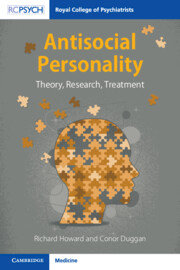Book contents
- Antisocial Personality
- Reviews
- Antisocial Personality
- Copyright page
- Contents
- Preface
- Chapter 1 The Nosological Background
- Chapter 2 Interpersonal Perspective
- Chapter 3 Developmental Perspective
- Chapter 4 Brain and Behaviour Perspective
- Chapter 5 The Epidemiology of Antisocial Personality Disorder
- Chapter 6 Treatment of ASPD, Part 1
- Chapter 7 Treatment of ASPD, Part 2
- Chapter 8 Legal and Ethical Issues in ASPD and Psychopathy
- Chapter 9 Conclusions and Future Directions
- Index
- References
Chapter 6 - Treatment of ASPD, Part 1
General Approaches
Published online by Cambridge University Press: 20 January 2022
- Antisocial Personality
- Reviews
- Antisocial Personality
- Copyright page
- Contents
- Preface
- Chapter 1 The Nosological Background
- Chapter 2 Interpersonal Perspective
- Chapter 3 Developmental Perspective
- Chapter 4 Brain and Behaviour Perspective
- Chapter 5 The Epidemiology of Antisocial Personality Disorder
- Chapter 6 Treatment of ASPD, Part 1
- Chapter 7 Treatment of ASPD, Part 2
- Chapter 8 Legal and Ethical Issues in ASPD and Psychopathy
- Chapter 9 Conclusions and Future Directions
- Index
- References
Summary
This chapter examines the evidence of efficacy in the pharmacological and psychological treatment of those with ASPD in good-quality trials for those with ASPD and finds that such evidence is lacking. Given the range of impairments in those with ASPD cited in the previous chapter, here we propose a pragmatic approach that relies on the non-specific effects of psychotherapy, together with the judicious use of medication as required. The former focuses on (1) engagement through an explanation of the disorder, (2) the creation of expectations and (3) identifying relevant treatment options. Judicious use of medication, when necessary, is also recommended. This process is organised by a case conceptualisation of the individual which seeks to integrate the nomothetic (i.e., general principles) with the idiographic (i.e., individual) aspects of the case. For those with ASPD, particular attention needs to be paid to managing therapeutic ruptures as the impulsive and paranoid traits in those with ASPD are likely to lead to premature termination. We believe that these principles offer the practitioner not only a sensible and defensible procedure, but one which is within the ambit of most community mental health teams so it has wide applicability.
- Type
- Chapter
- Information
- Antisocial PersonalityTheory, Research, Treatment, pp. 88 - 103Publisher: Cambridge University PressPrint publication year: 2022



